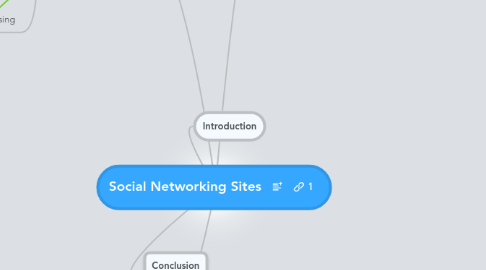
1. Pros
1.1. Event Organisation
1.1.1. Many Social networking sites have event organisation abilities
1.2. Keeping up to date with Friends and Family
1.2.1. A continuously updating live feed of:
1.2.1.1. New photos.
1.2.1.2. Status updates
1.2.1.3. Comments between friends and others
1.2.1.4. New videos
1.2.1.5. Who your friends are:
1.2.1.5.1. Commenting on / Talking to
1.2.1.5.2. Friends with
1.2.1.5.3. Viewing photos of
1.2.1.5.4. In a relationship with.
1.2.1.5.5. Relations between friends
1.3. Socialising
1.3.1. Instant Messaging (on some)
1.3.2. Messages
1.3.3. Comments (public and private)
1.3.4. Viewing photo's and leaving comments (discussions)
1.3.5. Showing your friends what you enjoy, what websites you visit, what groups and bands etc you like.
2. Introduction
3. Conclusion
4. New node
5. Cons
5.1. Security
5.1.1. Password protection
5.1.2. Account infiltration
5.1.2.1. Phishing sites
5.2. Privacy
5.2.1. No information is private
5.2.1.1. Un-Knowingly public
5.2.1.2. Knowingly Public
5.2.1.2.1. Despite knowing that your information is openly available, it is hard to track and trace who is viewing this information, and exactly when they see it. On sites such as facebook, the news feed is continuously updated, with not only obvious things such as status updates, but also groups that you've liked, friends you're now connected with, photos you've been viewing, latest likes and comments. All this is available.
5.2.2. Facebook Specific: Facebook can see what you're doing online, by using over 1 million, non-facebook sites:
5.2.2.1. http://bits.blogs.nytimes.com/2011/09/27/as-like-buttons-spread-so-do-facebooks-tentacles/
5.2.2.1.1. What this article discusses is how more and more sites are using the 'like' button on their page, so you can spread news of that site. But because you dont even logg in to use this button, it means that facebook know's you're there, even if you dont click on the button, what this means is, without knowlege, facebook could potentially follow you across hundreds of sites, know what you like, what you search, what you view. This will all result in them gaining knowlege on what to advertise on your home page. Social Engineering, Social Intrusion, And Social Marketing at an extreme level.
5.3. An example: Default privacy settings on facebook:
5.3.1. On facebook when you either sign up for a brand new account, or simply wish to change your prvacy settings back to private, a lot of people don't realise, read, or understand what they are allowing. These are the set standard security / privacy controls in place on a basic facebook account:
5.3.1.1. http://mattmckeon.com/facebook-privacy/ What this link displays is a graphical representation of the evolution of the default privacy settings of facebook over time.
5.3.1.2. https://www.eff.org/deeplinks/2010/04/facebook-timeline This is much the same as the graphical version above, but it's text based and give's a readable representation / story of how facebook, and their view on privacy has changed.
